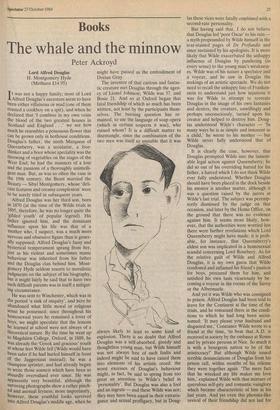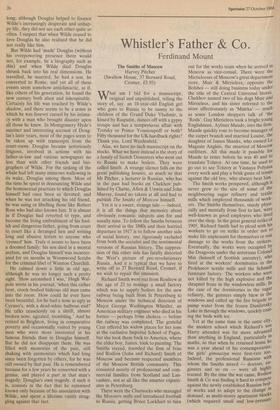Books
The whale and the minnow
Peter Ackroyd
Lord Alfred Douglas H. Montgomery Hyde (Methuen £14.95) It was not a happy family; most of Lord Alfred Douglas's ancestors seem to have been either villainous or mad (one of them roasted a cookboy on a spit), and when he declared that 'I combine in my own veins the blood of the two greatest houses in Scotland and England . . .' we see how much he resembles a poisonous flower that can be grown only in hothouse conditions. Douglas's father, the ninth Marquess of Queensberry, was a secularist, a free- thinker and a boor whose speciality was the throwing of vegetables on the stages of the West End; he had the manners of a lout and the passions of a thoroughly unintelli- gent man. But, as was so often the case in the 19th century, the Beast married the Beauty — Sibyl Montgomery, whose 'deli- cate features and creamy complexion' were to be sorely tried in subsequent years.
Alfred Douglas was her third son, born in 1870 (at the time of the Wilde trials in 1895, therefore, he was no longer quite the `gilded youth' of popular legend). His father ignored him, and the dominant influence upon his life was that of a mother who, I suspect, was a much more nervous and obsessive figure than is gener- ally supposed; Alfred Douglas's fussy and hysterical temperament sprang from her, just as his violent and sometimes manic behaviour was inherited from his father and the Douglas clan behind him. Mont- gomery Hyde seldom resorts to moralistic judgments on the subject of his biography, but it might fairly be said that to have two such difficult parents was in itself a mitigat- ing circumstance.
He was sent to Winchester, which was in the period 'a sink of iniquity', and here he abandoned what little moral or religious sense he possessed; since throughout his homosexual years he remained a lover of boys, we might speculate that the lessons he learned at school were not always of a theoretical nature. By the time he went up to Magdalen College, Oxford, in 1889, he Was already the 'Greek and gracious' youth at whose feet Wilde fell (Wilde would have been safer if he had hurled himself in front of the Juggernaut instead); he was a champion sprinter, and had already begun to write those sonnets which have been so absurdly overvalued ever since. He was apparently very beautiful, although the surviving photographs show a rather pinch- ed and asexual feyness; more importantly, however, these youthful looks survived into Alfred Douglas's middle age, when he might have passed as the embodiment of Dorian Gray.
The inventor of that curious and fantas- tic creature met Douglas through the agen- cy of Lionel Johnson; Wilde was 37, and Bosie 21. And so at Oxford began that fatal friendship of which so much has been written, not least by the participants them- selves. The burning question has re- mained, to use the language of soap opera (which in certain respects it was), who ruined whom? It is a difficult matter to disentangle, since the combination of the two men was itself so unstable that it was always likely to lead to some kind of explosion. There is no doubt that Alfred Douglas was a self-absorbed, greedy and thoughtless young man, but Wilde himself was not always free of such faults and indeed might be said to have raised them into elements of his artistic creed: the worst excesses of Douglas's behaviour might, in fact, be said to spring from too great an attention to Wilde's belief in `personality'. But Douglas was also a fool and an ingrate — and these Wilde was not; they may have been equal in their extrava- gance and sexual profligacy, but in Doug- las these vices were fatally combined with a second-rate personality.
But having said that, I do not believe that Douglas led 'poor Oscar' to his ruin — a myth propounded by Wilde himself in the tear-stained pages of De Profundis and since sustained by his apologists. It is more likely that Wilde exacerbated the unhappy influence of Douglas by pandering (in every sense) to the young man's weakness- es. Wilde was of his nature a spectator and a voyeur, and he saw in Douglas the makings of an artistic spectacle. We do not need to recall the unhappy fate of Franken- stein to understand just how injurious it was for Wilde .to attempt to recreate Douglas in the image of his own fantasies and desires; the creature, unwillingly and perhaps unconsciously, turned upon his creator and helped to destroy him. Doug- las understood Wilde's character — 'In many ways he is as simple and innocent as a child,' he wrote to his mother — but Wilde never fully understood that of Douglas.
It is clearly the case, however, that Douglas prompted Wilde into the lament- able legal action against Queensberry; he did so out of his overriding hatred for his father, a hatred which I do not think Wilde ever fully understood. Whether Douglas should have been placed in the dock beside his mentor is another matter, although it was a question raised by the jurors at Wilde's last trial. The subject was peremp- torily dismissed by the judge on that occasion, and later by the Home Office, on the ground that there was no evidence against him. It seems more likely, how- ever, that the authorities were worried lest there were further revelations which Lord Queensberry might have made: it is prob- able, for instance, that Queensberry's eldest son was implicated in a homosexual scandal concerning Lord Rosebery. As for the relative guilt of Wilde and Alfred Douglas, it is my own guess that Wilde condoned and inflamed his friend's passion for boys, procured them for him, and satisfied his own lusts vicariously by be- coming a voyeur in the rooms of the Savoy or the Albermarle.
And yet it was Wilde who was consigned to prison. Alfred Douglas had been told to leave for the Continent at the time of the trials, and he remained there in the condi- tions to which he had long been accus- tomed: 'It may please your husband and disgusted me,' Constance Wilde wrote to a friend at the time, `to hear that A.D. is received in society by the embassy at Rome and by private persons at Nice. So much it is with a bourgeois nation to be of the aristocracy!' But although Wilde issued terrible denunciations of Douglas from his prison cell, within months of his release they were together again. The mere fact that he wrecked my life makes me love him,' explained Wilde with that mixture of querulous self-pity and romantic vainglory which became characteristic of him in his last years. And yet even this phoenix-like revival of their friendship did not last for long; although Douglas helped to finance Wilde's increasingly desperate and unhap- py life, they did not see each other quite so often. I suspect that when Wilde ceased to love Douglas he also realised that he did not really like him.
But Wilde had 'made' Douglas (without his overpowering presence there would not, for example, be a biography such as this) and when Wilde died Douglas shrunk back into his real dimensions. He travelled, he married, he had a son, he converted to Rome; and yet all of these events seem somehow anticlimactic, as if, like others of his generation, he found the new century both alien and inhospitable. Certainly his life was touched by Wilde's shadow, and there seems to be a sense in 'which he was forever cursed by his intima- cy with a man who brought disaster upon all those he knew. In Montgomery Hyde's succinct and interesting account of Doug- las's later years, most of the pages seem to be taken up with transcripts from the court-room. Douglas became notoriously litigious, involved in actions with his father-in-law and various newspapers no less than with other friends and bio- graphers of Wilde. For the sinking of the whale had left many minnows wallowing in its wake, Douglas among them. Most of the time he spent in denouncing Wilde and the homosexual practices to which Douglas himself had once been so devoted; and when he was not attacking his old friend, he was suing or libelling those like Robert Ross who had also known him. It is almost as if Douglas had reverted to type, and become the living embodiment of his fool- ish and dangerous father, going from court to court like a deranged hen and writing long and abusive letters to anyone who `crossed' him. Truly it seems to have been a doomed family: his son died in a mental asylum, and Douglas himself was incarcer- ated for six months in Wormwood Scrubs for the criminal libel of Winston Churchill.
He calmed down a little in old age, although he was no longer such a pretty sight. 'How astonished I was,' Hugh Wal- pole wrote in his journal, 'when this rather bent, crook-bodied hideous old man came into the room. How could he ever have been beautiful, for he had a nose as ugly as Cyrano's, with a dead-white bulbous end? He talks ceaselessly on a shrill, almost broken note, agitated, trembling.' And he retired to Brighton, living in comparative poverty and occasionally visited by young men who were more interested in his famous friends than in Douglas himself. But he did not disappoint them. He was filled with memories of the past, still shaking with animosities which had long since been forgotten by others, for he was still owned by that past. He is remembered because for a few years he consorted with a genius, and played a part in that man's tragedy; Douglas's own tragedy, if such it is, consists in the fact that he remained known only because of his association with Wilde, and spent a lifetime vainly strug- gling against that fact.



















































 Previous page
Previous page